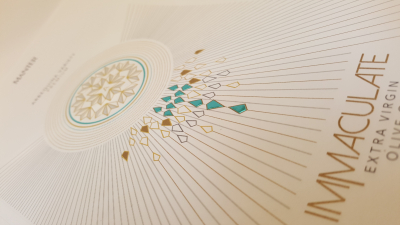Immaculate labels
Innovation. In the era of visual and tactile communication, Arconvert provides the most effective materials to trigger stimuli and emotions, depending on the relevant target. Interview with marketing manager Chiara Tomasi

For many years the thorny issue of labels has been their vulnerability, especially with a complex and, let us face it, greasy raw material like olive oil. Labels get easily dirty and no longer have good appearance, especially when focusing on the quality of extra virgin olive oil and its presentation, sometimes in luxury gift boxes. Disappointment appears clear in customers’ eyes as this investment is considered as risky. Indeed, when opening a bottle and pouring oil, sometimes the problem is just around the corner. Once labels are stained, there is nothing to be done. This has changed now, as some excellent labels are very reassuring in this sense and are no longer similar to anti-stain labels of the past, which were definitely ugly and not very effective. Research has made remarkable progress and issues can now be easily solved.
You have largely revolutionized the market with “The Immaculate Papers by Manter” project…
We have, as Arconvert innovative range of 100% anti-stain self-adhesive papers no longer includes usual anti-stain coated paper or simple protective films that are only applied to the label front.
Why has your initiative being successful?
Because of our synergy with the parent company Fedrigoni, which has allowed us developing new products starting from this raw material: paper.
Innovation in Immaculate Papers lies in “greaseproof” treatment…
It does, as this exclusive treatment has been added to paper pulp, to make it completely oil-drop-proof. The development of nine valuable materials has complied with top quality standards and products have been launched on the market only after conducting thorough tests to check their anti-stain performance.
At Olio Officina Festival you spoke about labels as sensory marketing tools, which can impact on purchase decisions. Could you elaborate on that?
Packaging appeal is crucial. Nicely dressed bottles are extremely enticing, not only to sight but also to touch, as good labels stand out. Neurosciences explain it very clearly. Our sensory system guides our urges. Emotions triumph over rationality. Senses therefore prevail in purchase decisions.
This is why one should never neglect bottle appearance…
Of course, because products we purchase are “tested” only later, at home. Even though price appears among the reasons for purchase, bottles do actually make the difference, having specific labels, shapes, colours and textures that incite our senses. Statistics suggest that good packaging attract the attention of at least an additional 76% of consumers. In addition, I believe that it is worth attracting consumers by investing more in aesthetics and features of packaging and labels, rather than “diminishing” products by playing the usual card of promotions.
It is to be noted that anti-stain labels are not used exclusively on excellent products. They are indeed the ideal solution also for popular extra virgin olive oil used daily, as well as for the whole range of olive oils…
Indeed. “The Immaculate Papers by Manter” is a line designed for extra virgin olive oil, but equally appropriate for the whole range of olive oils. They are quality papers that become functional by ensuring label integrity and cleanliness, and considering paper quality and beauty, they are particularly eye-catching for consumers who have to choose a product among the numerous ones on the shelf. They normally choose the packaging that has the best appearance.
Nice labels also give added value to olive oil…
Exactly. If consumers positively perceive labels, perceived olive oil value is higher. Neurosciences and statistical data prove it: when looking at a bottle and a label, the human brain immediately links “form” and “content”. Therefore, if the package and the label are perceived as poor, the same will occur for the relevant content and vice versa. This is why, in the era of visual and tactile communication, Arconvert offers the best materials inciting stimuli and emotions depending on the relevant target.
We have therefore created a range of nine anti-stain products having different prices.
Olive oil used daily can therefore equally stand out on the shelf. It is to be noted, indeed, that olive oil is still one of the most genuine products on our tables. Designing nice packaging and labels for genuine products simply means “properly telling the truth”, without breaking the “quality promise” made to consumers who purchase these products.
All is left to do is design coordinated packaging, to achieve more effective results…
Absolutely. Furthermore, following our synergy with the parent company Cartiere Fedrigoni, it has all become even more effective and streamlined, by using the same type of paper for labels, boxes and tags including the relevant storytelling or for shoppers and brochures. A coordinated image and details can indeed make the difference.
The word. NEUROSCIENCES
When applied to consumers – Chiara Tomasi explained – neurosciences lay solid scientific foundations and prove to be effective assessment tools that can help companies refine their marketing and communication techniques, by making products more appealing and consequently increasing sales. Neurosciences – Airconvert marketing manager added – go beyond traditional and old-fashioned market research, as they can scientifically assess the degree of appreciation for a specific label design, depending on consumers’ emotions. Once these parameters have been assessed, using several tools, including eye tracker, EEG, face reader and others, one can consequently select the most appropriate and effective design for the relevant target.
This kind of analysis – Chiara Tomasi added – has already been widely accepted in the wine industry. However, these ideas are moving their first steps in the olive oil sector, as many producers are convinced that only product quality counts and that packaging is secondary. Notwithstanding, the market is increasingly fragmented and competitive, which makes it crucial to be in step with the times. Small producers believe that only big oil producers can be part of it. What about networking?
To comment you have to register
If you're already registered you can click here to access your account
or click here to create a new account


Comment this news